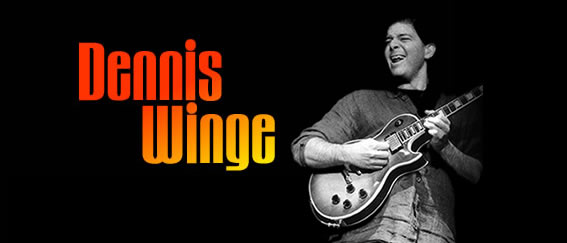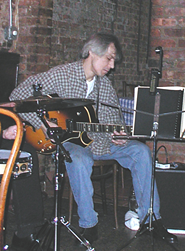Remembering My Former Teacher: Ron Parmentier
/in Blog Posts/by denniswingeFirst Encounter
Having gotten his flyer stub from my girlfriend, I really didn’t want to call Ron for lessons initially, and I procrastinated for several weeks. I knew I needed a change because the R&B band I was in wanted to play “My Funny Valentine.” I looked at the lead sheet, listened to the Miles Davis recording, and tried to figure out what was going on, but to no avail, having never played jazz before.
When I first met Ron, he was teaching another student even though I had been scheduled for a lesson. He apologized for the double booking and promised to get me in soon. I went home and played “Secret of Life” by James Taylor and asked myself if I really wanted to get into jazz guitar. After all, I was already 28, and that was too old to learn a new genre—or so I thought at the time.
Group Lessons and Jam Sessions
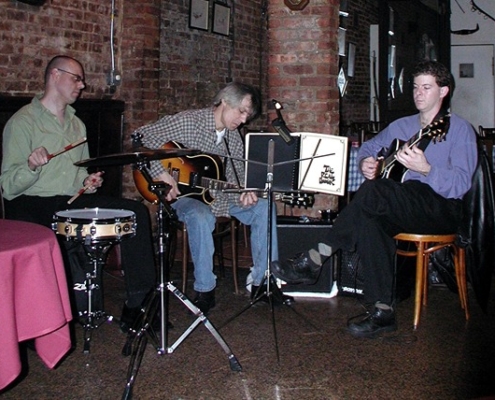 Almost immediately when I started, it wasn’t just one-on-one lessons. I’m not sure of the format exactly (maybe it was improvised), but I played with Ron and student John Darby. Ron said there was a lot for me to learn. We played “Summertime,” and I was totally foreign to the chord change of going to an F7 in the key of Am, but years later, that’s the way pianist Jon Cobert played it too, so I knew it had validity. I also heard about other students such as Roland Marconi and another named Cole. I am still friends with John and Roland to this day.
Almost immediately when I started, it wasn’t just one-on-one lessons. I’m not sure of the format exactly (maybe it was improvised), but I played with Ron and student John Darby. Ron said there was a lot for me to learn. We played “Summertime,” and I was totally foreign to the chord change of going to an F7 in the key of Am, but years later, that’s the way pianist Jon Cobert played it too, so I knew it had validity. I also heard about other students such as Roland Marconi and another named Cole. I am still friends with John and Roland to this day.
We would jam at Ron’s house on Friday nights for 2 to 3 hours, and sometimes have our own jam sessions without Ron. These jam sessions were a great opportunity to stretch out. I remember trying to figure out certain chord voicings that were new. Because there were so many other guitarists in the room (it could be as many as 5 or 6, or as few as 3), you could afford to lay out for a little while, find your chord voicing, and get it ready, and play it when it came around, then work on the next voicing, or wait for that one to come around again. Of course, you could also solo at length. The jam sessions were valuable, and I think there was a time when I wasn’t even doing regular lessons with Ron, only the Friday night sessions.
Lessons in Jazz and Beyond
From Ron, I learned about the jazz tradition and philosophy, which included things like the theory behind the tunes, the history of jazz, and some of the best albums to listen to, such as Wes Montgomery’s “Smokin’ at the Half Note” and Howard Alden’s “Thirteen Strings” album with George Van Eps. He taught me how to stretch and be creative, how to play counterpoint with another guitarist or instrumentalist, which is something that I find a lot of jazz musicians aren’t exactly used to, and are surprised when I try to initiate it on a gig. He also taught me how to listen to the whole group and contribute meaningfully while comping. I found the philosophy/theory/history almost more valuable than the actual guitar content. Similarly, Roland says “he was such a creative player and I learned a lot from him not only about guitar playing and theory but about music as an expression of intellect and spirit.”
Ron’s Sound
Ron’s sound inspired me. He played an old ES175 with an old Polytone amp with the bass turned up. I loved that sound and still use my Polytone amp to this day. I also still use my ES165 (Herb Ellis model with only one pickup) sometimes as well. Ron’s neighbor, however, never liked that he would play loud, and they would have rows. I never knew that guy’s real name because Ron always called him “Bozo.”
Evolving from Student to Apprentice
Overall, I took lessons with Ron for several years, and our relationship morphed into a teacher-apprentice type of thing. I’d go to his house under the auspices of starting a band together, and we would rehearse for hours on jazz standards, or sometimes his original tunes, several times a week. I had a girlfriend at the time who had never met Ron but hated him for taking up all my free time and also for other things that she heard he would say or do.
Ron also inspired me to start teaching guitar. I was in Brooklyn and would use yellow flyers, and he was in Manhattan and used green flyers, so there was no competition. He taught me how to handle inquiries, where to hang the flyers, and gave me guitar teaching material, some of which I still use. He didn’t want to teach rock anymore, so he gave me songbooks by Bob Dylan, Eric Clapton, the Grateful Dead, and Jimi Hendrix, all of which I still have.
Ron’s Unique Lifestyle
He was quite a character. He was from Detroit and had a rough edge about him. In his two-room apartment where the lessons took place, he would fold up the bed, and the student would sit in that room, while he’d be pretty far away from you in the adjoining kitchen area. One time I referred a friend of mine who managed comedians for a living, and he later joked that he didn’t want to take lessons from someone who taught from another room! I am still influenced by this as I sit across the room from my students now, giving them plenty of personal space, unless I need to get up close to show them something or help them concentrate on something.
Ron was a big pothead and also smoked cigarettes. He would buy huge bags of weed and get stoned right in front of us while teaching, especially during the long jams. The more he’d smoke, the more he would tell stories about his personal life and about what I refer to as the “lore” of jazz. These were sometimes bizarre stories, but other times they were deep and meaningful. Roland says “we had amazing lessons that turned into philosophical discussions that went for hours. I would sometimes get home at 3 a.m. and my wife at the time found it difficult to believe I was at a guitar lesson.”
Ron was divorced and John tells me had 2 daughters, but I never heard him mention them. I got the impression he was lonely and would walk his very cute dog named Pete, and people would interact with him because of the dog. As Roland told me, “being such a unique person and thinker, he had difficulties dealing with many people and told me once that his dog Pete saved his life when he was thinking of giving it all up.” Ron also got socializing opportunities with his students.
Memorable Moments
When I lost my full-time job, Ron seemed depressed also on the night that I told him. After the jam, we got donuts from his favorite shop on 14th Street and 7th Avenue, and we just sat there on the corner eating them rather dejectedly, that is until a Playboy bus came slowly down the street with scantily clad models dancing in the back. Ron leaped to his feet and cheered enthusiastically, and the gloom temporarily faded. When I told my girlfriend about this, she hated him even more.
Another time I came over, he had been sick and had been throwing up, but had showered and was okay to teach. I wasn’t sure what to make of it all, so I kept quiet, and he chided me, “Well, just do something!” because he didn’t like that I showed no reaction. Later that night, he called me to apologize.
Gigs and the Transition
At some point, we decided to do a gig together, and it was at a local Italian restaurant around the corner from his apartment in Greenwich Village. In fact, there were two times we played there. The second time was with Cole on snare drum. I don’t remember what we played, but 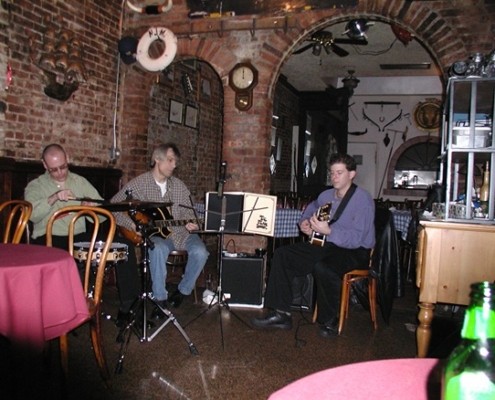 I remember it was fun, and the audience, mostly fellow students, was supportive. By the time of the second gig, I was no longer a student of Ron’s and had begun studying with Jack Wilkins. Not because I had left him, but just because he didn’t think my musicianship was all that great, Ron badmouthed me to another student. It didn’t really bother me, though, because I had moved on.
I remember it was fun, and the audience, mostly fellow students, was supportive. By the time of the second gig, I was no longer a student of Ron’s and had begun studying with Jack Wilkins. Not because I had left him, but just because he didn’t think my musicianship was all that great, Ron badmouthed me to another student. It didn’t really bother me, though, because I had moved on.
It was just as well that I had found Jack because Ron was mostly a creative chord guy and liked thick, lush harmony, à la Bill Evans, but was never a strong single-note player, in my opinion. Once, when the subject of double-time single-note lines came up, Ron tried to demonstrate fast 16th note lines, and he didn’t have the technique to pull it off. The other student who was with us called him out on it, saying, “Yeah, but that’s not what you were doing.”
They had a big blowout, and their student-teacher relationship ended that night. Of course, I stayed in the middle and heard criticism of the other from both sides. Years later, I found some recordings of myself jamming with Ron, and transcribed some of his lines. They were in fact 16th notes, but he only had 2 common rhythmic phrases and they were both grouped over 3 beats. For the music geeks among you, here are is a rhythmic transcription of them followed by a short audio sample of my scatting them.
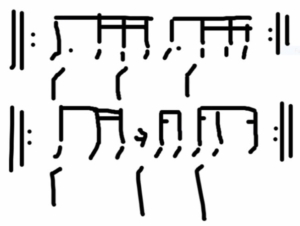
I suspect that this grouping over 3 beats was not conscious on Ron’s part, and that he was sort of imitating double-time lines that he heard other jazz players do, but did not have the technique to pull off other variations. If it was conscious, he would have been able to explain it to us rather than get defensive, and if he did have the technique, he would have been able to demonstrate 16th notes that were grouped in 2 or 4 beat phrases.
Ron’s Greatest Teaching
After I left, Ron contacted me a few times, once to ask me to put his name on my website, which I did alongside Jack’s name and still have up today. Another time Ron contacted me to tell me he had a terminal illness, but not to feel sorry for him because he had found a deeper spiritual meaning in this suffering.
It’s perhaps no coincidence that I just finished re-reading Victor Frankl’s “Man’s Search for Meaning.” It describes all the horrors of having lived in Auschwitz and several other concentration camps during WWII, and how he rose above the suffering psychologically. Frankl says that we can’t avoid suffering, but we can choose how to cope with it and find meaning and significance in it, which compels us to make better choices, even if that choice is to die with dignity.
Ron probably never read this book, but this is exactly what I saw him do. He found intense spiritual meaning in being terminally ill and arrived at a deep inner peace because of it. This was by far his greatest teaching.
Farewell, Ron
I will always remember you, Ron, and even though you were a character and had many quirky traits, your heart was in the right place, and I respect you and even love you.
If you are planning an event you want to explore your options for live music, book a free music consultation with me or simply write to me on the contact page.
Top Myrtle Beach musicians, Dennis Winge Music, provide live music for weddings, parties, and events across North Myrtle, Conway, and Pawleys Island.

 Live Band vs. DJ for Your Wedding
Live Band vs. DJ for Your Wedding